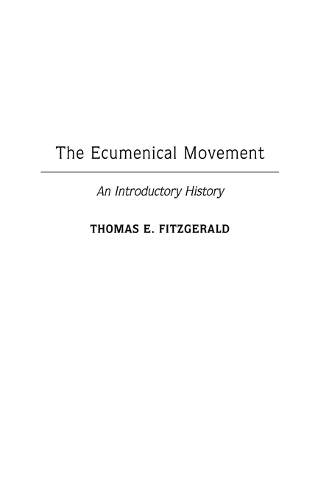
The Ecumenical Movement: An Introductory History
(Hardback)
Publishing Details
The Ecumenical Movement: An Introductory History
By (Author) Thomas E. FitzGerald
Bloomsbury Publishing PLC
Praeger Publishers Inc
30th April 2004
United States
Classifications
General
Non Fiction
280.04209
Physical Properties
Hardback
288
Width 156mm, Height 235mm
595g
Description
What is Ecumenism How and when did it start What are its goals and how will they affect the future of the Christian churches This book answers these questions and examines the remarkable story of new encounters between Orthodox, Roman Catholic, Anglican, Old Catholic, and most Protestant churches. Most of these churches have been divided for centuries over issues of theology, faith, and practice. Ecumenism seeks to reconcile these differences and to bring the churches together into a new unity based on their commonalities and their understanding of Christian faith. Here, FitzGerald traces the history of the churches and their divisions and focuses on the ways in which the Ecumenical movement began and the efforts that have been made to assist the churches in overcoming age-old strife, animosity, and misunderstanding. For centuries, Christian churches have remained divided over their doctrinal differences, but beginning in the late nineteenth century, churches and their members slowly began to emerge from their isolation. They began to abandon competition, mistrust, and misunderstanding in an effort to seek out their common interests and faith through meetings and organizations meant to bring them together. The encounters between the churches led to proposals for common prayers for unity, and for common witness in society. While not without difficulty, these encounters have fostered a renewal in Christian theology, worship, and witness, affecting all levels of church life. The process has touched Christians all over the world in various ways. FitzGerald carefully traces the history of the movement and its impact on the churches themselves, as well as the believers who attend them, making this important reading for all Christians and anyone interested in learning more about church division and efforts to restore unity.
Reviews
"A history of the ecumenical movement written by an Orthodox theologian is a welcome addition to the growing body of literature on ecumenism at a time when the Orthodox churches have a limited involvement in ecumenism, especially with the World Council of Churches....[t]he present volume is an excellent resource for an introductory course on ecumenism for graduate and even undergraduate students....[v]ery well written and captivating even for a reader who knows nothing about Christianity."-Studies in Religion
"The subtitle of this book is extremely important. FitzGerald admits that he has "a very modest intention": to introduce the ecumenical movement to a wider audience. That audience obviously includes relatively uninformed laypersons and young students of religious history. FitzGerald hopes that this introduction will give readers "an appreciation of the essential elements of the ecumenical movement..,."Recommended. Undergraduates and interested general readers."-Choice
The subtitle of this book is extremely important. FitzGerald admits that he has "a very modest intention": to introduce the ecumenical movement to a wider audience. That audience obviously includes relatively uninformed laypersons and young students of religious history. FitzGerald hopes that this introduction will give readers "an appreciation of the essential elements of the ecumenical movement..,."Recommended. Undergraduates and interested general readers.-Choice
[P]resents the ecumenical movement as a movement toward reconciliation and argues that the evolving inter-church dialogue has had a significant impact on the shape of Christian life and practice. The book is an overview and an effective organizing reference for the serious researcher.-Catholic Library World
A history of the ecumenical movement written by an Orthodox theologian is a welcome addition to the growing body of literature on ecumenism at a time when the Orthodox churches have a limited involvement in ecumenism, especially with the World Council of Churches....[t]he present volume is an excellent resource for an introductory course on ecumenism for graduate and even undergraduate students....[v]ery well written and captivating even for a reader who knows nothing about Christianity.-Studies in Religion
"Presents the ecumenical movement as a movement toward reconciliation and argues that the evolving inter-church dialogue has had a significant impact on the shape of Christian life and practice. The book is an overview and an effective organizing reference for the serious researcher."-Catholic Library World
"[P]resents the ecumenical movement as a movement toward reconciliation and argues that the evolving inter-church dialogue has had a significant impact on the shape of Christian life and practice. The book is an overview and an effective organizing reference for the serious researcher."-Catholic Library World
Author Bio
THOMAS E. FITZGERALD is Professor of Church History and Historical Theology at Holy Cross Greek Orthodox School of Theology in Brookline, Massachusetts. He has served as Executive Director of the Program on Unity and Renewal at the World Council of Churches in Geneva, Switzerland. As a theologian in the Orthodox Church, he has participated in theological conferences and ecumenical dialogues in over 30 countries. He is the author of a number of articles and books including The Orthodox Church published by Greenwood Press.
